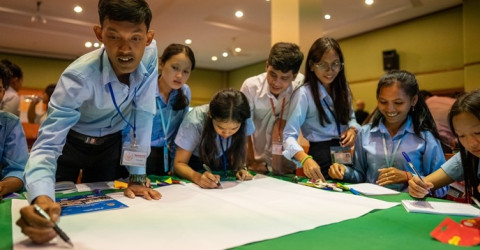
GCED Basic Search Form
Quick Search
You are here
News

This year marks the 40th anniversary of the end of the Khmer Rouge regime in Cambodia and the opening of the Tuol Sleng Genocide Museum (TSGM). On this occasion, UNESCO supported the TSGM, Ministry of Culture and Fine Arts (MoCFA) of Cambodia in organizing an international conference on the topic of “Genocide, Memory and Peace”, with funding support from KOICA. From 28-30 August 2019, the conference convened experts from over 9 Cambodian and 25 international institutions in Phnom Penh to share experience on the management of genocide-related digitalized archives. The conference also served to inform the process of TSGM becoming a peace education site to support efforts of reconciliation.
The Tuol Sleng Genocide Museum was first opened for visitors in 1979 on the site of the former detention, interrogation and extermination center “S-21” in Phnom Penh, operated by the regime of “Democratic Kampuchea”, commonly known as the “Khmer Rouge regime”. From 1975-1979, more than 18,000 prisoners were interrogated, tortured, and murdered on site or in the killing field of Choeung Ek.
The conference was organized within the framework of the “Tuol Sleng Genocide Museum Archives Preservation and Digitization Project”, implemented by UNESCO in partnership with the Ministry of Culture and Fine Arts of Cambodia, and with generous support from the Korea International Cooperation Agency (KOICA).
When the Khmer Rouge regime ended, hundreds of thousands of pages documenting the Khmer Rouge’s crimes were secured. Today, these archives are housed in Tuol Sleng Genocide Museum, forming the most comprehensive collection of documents of the Democratic Kampuchea prison system. The Museum’s archives were inscribed into UNESCO’s Memory of the World (MoW) Register in 2009.
The TSGM archives project seeks to promote peace and intercultural dialogue, facilitate reconciliation efforts, and expand educational outreach, including through the preservation and digitization of the TSGM archives. Once digitized, the 400,000 pages of the archives will be incorporated into a database, facilitating access to rural Cambodians, youth, and international researchers, amongst others.
During the opening of the conference, the Secretary of State, H.E. Chuch Phoeurn from Ministry of Culture and Fine Arts, called on “national and international institutions and NGOs, running projects related to the Khmer Rouge regime, to work in collaboration with TSGM, and contribute to youth education on peace and memory in Cambodia.”
The work of historians and experts can essentially contribute to this process, explained Mr. Sardar Umar Alam, UNESCO Representative to Cambodia, “presenting historical facts and narratives, educating the younger generation on engaging meaningfully with their past, advocating for truth, and amplifying the voices of the voiceless.”
In his keynote address, Dr. Datuk Azemi Abdulaziz, Director General of the National Archives of Malaysia, underlined the value of mass atrocity archives through providing documentary evidence of the past and serving as a “bridge to the present and future”. This connection between past, present and future served as an overarching theme for the three-day conference and guided discussions among experts and exchanges with local university students, who were invited to participate on the second day of the Conference
Karel Fracapane, UNESCO Focal Point for Education about the Holocaust and genocide, emphasized the role education can play in this regard: “A lack of acknowledgement and acceptance of violent pasts and related traumas may fracture social cohesion and leave unchecked persisting grievances and divisive stereotypes. Education, specifically history education, can help to inform processes of dealing with violent pasts by creating an understanding of what happened and how this history continues to shape society today.”
One participating student explained, “the TSGM archive project will be very helpful for Cambodian education in general. It is often difficult for us to find specific information on Khmer Rouge history written in Khmer. These archives will help us conduct important research on our own history.”
The discussions on the second day evidenced the profound effect the digitization project has in fomenting dialogue within Cambodian society: Through the Tuol Sleng archives, the voices of Khmer Rouge victims continue to be heard by the country’s youth. As their fates and individual stories continue to shape Cambodia at all levels of society, access to such resources will allow young Cambodians to position themselves and to engage in proactive dialogues about their country’s past, present and future.
UNESCO is committed to promote education about genocides as a means to sensitize learners for the causes, dynamics and consequences of such crimes and to strengthen their resilience against all forms of discrimination. Learn more about UNESCO’s related activities.
URL:
